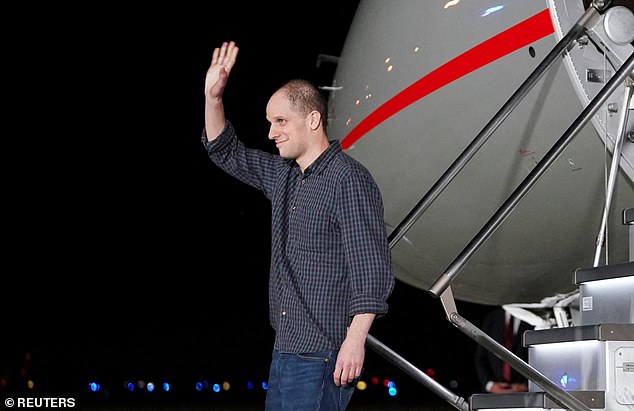Even the most seasoned observers of geopolitics were taken by surprise.
But behind the scenes, months of extremely tense negotiations, near-total failures and difficult moral compromises had been unfolding in the run-up to the biggest prisoner exchange between East and West in decades.
Not since the Cold War, when secret agents and political prisoners were routinely exchanged on Berlin’s Bridge of Spies, have so many captives been traded.
The extraordinarily complex deal, which saw 24 prisoners released from prisons in seven countries, had already collapsed and was in doubt until shortly before it was sealed. Among those released were two inmates with British citizenship, eight Russian agents, four Americans, five Germans and five Russian anti-Putin activists.
In the final hours of his presidency, a troubled Joe Biden played the role of reassurer as Western officials argued over terms.
American journalist Evan Gershkovich, who was released from detention in Russia, waves upon his arrival at Joint Base Andrews in Maryland, US, on Thursday

U.S. President Joe Biden and Vice President Kamala Harris greet Evan Gershkovich, who was released from detention in Russia, upon his arrival in the United States on Thursday

Gershkovich is hugged by his mother Ella Milman upon his arrival at Joint Base Andrews in Maryland, US, on Thursday.
In particular, the Germans were reluctant to release Kremlin assassin Vadim Krasikov (who shot dead a Chechen exile in Berlin five years ago), reportedly fearing that any exchange would become a “business model” for Russia.
But in secret meetings on the sidelines of other diplomatic engagements, President Biden finally persuaded Chancellor Olaf Scholz to agree.
According to analysts, this was a moral compromise that could have lasting consequences.
Because if Vladimir Putin was previously unsure of being able to win back valuable henchmen, he no longer has any doubts about it.
It was a backroom deal if there ever was one. Due to Russia’s illegal invasion and occupation of Ukraine, East-West relations are at their worst in decades.
However, as this exchange demonstrated, spy chiefs in London, Washington and Moscow are still talking to each other.
Throughout the negotiations, shadowy officials established a special channel to discuss the prisoners’ various proposals.

The exchange took place on Thursday in Ankara, the capital of Turkey. The country has previously acted as a mediator in prisoner exchanges between Russia and the West.

A Russian Tupolev Tu-204-300 aircraft prepares to land at Ankara’s Esenboga Airport in Ankara amid the exchange

Former US Marine Paul Whelan was also released as part of the massive prisoner exchange.

Radio journalist Alsu Kurmasheva, who was detained in October last year and charged with failing to register as a foreign agent, has also been released.

President Biden shared this photo shortly after it was posted with the caption: “After enduring unimaginable suffering and uncertainty, the Americans detained in Russia are safe, free, and have begun their journey back to the arms of their families.”
Among the detainees under scrutiny was former US Marine Paul Whelan, a citizen of four countries, including Britain.
He had been visiting Moscow to attend a wedding in December 2018 when he was arrested by Kremlin men wearing balaclavas and accused of espionage.
Mr Whelan spent 2,043 days in custody, singing national anthems to lift spirits and was known to joke that the Russians thought they had arrested James Bond when in fact they had arrested Bean.
His ordeal finally ended at a quarter to twelve p.m. local time, when the plane carrying him, Wall Street Journal correspondent Evan Gershkovich and others landed at Andrews Air Force Base in Maryland.
Mr Whelan was the first to be greeted by Mr Biden and Vice President Kamala Harris. He greeted them before shaking their hands.
The deal appeared to have collapsed months earlier following the death of Putin critic and political rival Alexei Navalny in a Russian prison cell in February.

Alsu Kurmasheva, second from left, is greeted by family members after arriving at Kelly Field following her release by Russia.

Former prisoners released by Russia, including Evan Gershkovich, former U.S. Marine Paul Whelan and journalist Alsu Kurmasheva, pose after landing at Joint Base San Antonio-Kelly Field, Texas, Aug. 2.
Germany had previously been willing to exchange Krasikov to ensure Navalny’s safety, but when he died, many observers thought the swap would end with him.
Work to resurrect the deal began immediately after its death at the Munich security conference, and continued even as Biden embarked on his disastrous televised debate against Donald Trump.
On July 19, a Russian court found Gershkovich guilty of espionage and sentenced him to 16 years in a maximum-security detention center. To the outside world, this sentence had all the appearance of a devastating blow for the journalist.
But those who are really in the know suspect otherwise. Before prisoner exchanges, Moscow authorities often sentence those who are soon to be released to very long prison terms.
Mr. Gershkovich and the others were pardoned yesterday because they finally had a taste of freedom.
(tags to translate)dailymail

